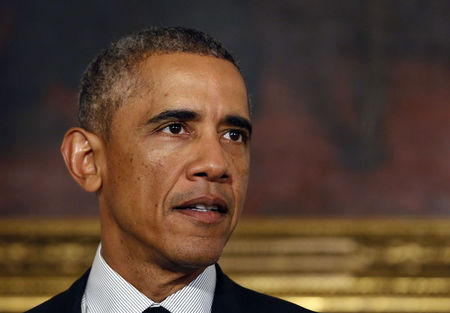By Phil Stewart
WASHINGTON (Reuters) - President Barack Obama wants some Arab participation in air strikes against the Islamic State in order to expand the campaign to Syria, reflecting U.S. concerns that any long-term campaign must count on regional involvement, U.S. officials say.
Obama authorised air strikes against Islamic State targets in Syria almost two weeks ago and was briefed on U.S. war plans last week by the U.S. military's Central Command. But Obama held off on approving those plans as diplomats pushed ahead with efforts to forge a coalition.
Two U.S. officials, speaking on condition of anonymity, said Arab participation was essential for Obama as he looked to expand the American campaign of air strikes to Syria from Iraq, where the U.S. military has already carried out 190 strikes as of Monday.
Several Arab countries have offered to join the United States in air strikes against Islamic State targets, a senior U.S. official told reporters on Sept. 14.
But the United States has so far refused to detail which nations have given private assurances to Washington that they would join in air strikes in Syria, part of a broader strategy against the Islamic State that includes training and arming moderate Syrian opposition fighters.
U.S. Ambassador to the United Nations Samantha Power said in television interviews over the weekend that other nations were willing to join air strikes in Syria.
"I will make you a prediction," Power said on ABC. "We will not do the air strikes alone if the president decides to do the air strikes."
Several Arab states have powerful air forces, including Saudi Arabia and United Arab Emirates. Saudi Arabia, for example, has also already agreed to host U.S. training of Syrian opposition fighters.
But many Gulf Arab states have been reluctant to be seen aggressively joining the U.S. campaign in Iraq and Syria, fearing in some cases reprisals by extremists or forces loyal to the Syrian government.
The White House last week declined to "telegraph" when strikes might occur or what preconditions stood in the way.
Obama will give a speech at the U.N. General Assembly on Wednesday to make the case again for world action against Islamic State.
He will also chair a meeting with global leaders to develop a strategy for preventing foreign fighters who have sworn allegiance to Islamic State from returning to their home countries to launch attacks against civilians.

While Americans support air strikes, there is little appetite for a long campaign against the group, a Reuters/Ipsos poll showed. Still, U.S. officials suggest any campaign against the group in Syria will take years.
(Reporting by Phil Stewart; Editing by Sandra Maler and Ken Wills)
